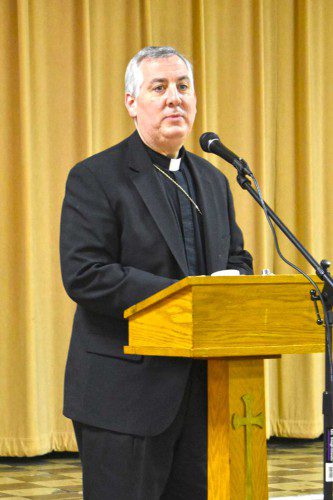Published in the March 17, 2017 edition
By BOB BURGESS
LYNNFIELD — In an eye-opening display of directness and with an unflinching willingness to address significant church issues, Bishop Mark O’Connell fielded any and all questions from area Catholics Tuesday night, March, 7, at Our Lady of the Assumption Church.
Among the weightier topics: The church’s sexual abuse crisis, the changing rules on marriage annulment, how the modern church positions itself in an ever-changing world, how to deal with the confusion of the institution’s stand on same sex unions, whether the church is too lenient, whether the church is too strict, what happens when the older generation of loyal benefactors leaves us, where do young people fit into today’s Catholicism and how should the church go about attracting more into the fold.
Above all, however, this third in a series of “Meet the Bishop” events showed people’s faith remains intact no matter the concerns they have about the church’s ability to resolve its problems — old ones and new — as the 21st century rolls along.
Bishop O’Connell, who is also the new pastor at St. Theresa Church in North Reading, is responsible for the Archdiocese’s parishes north of Boston. At one point during last week’s discussion, he told the audience that the Catholic church is “treading water at the moment and we have to learn how to swim. Talking about it, I think, is how we get there.”
Our Lady of the Assumption Pastor Paul Ritt, who has known O’Connell for at least 35 years, said it is part of the bishop’s character to “engage in this kind of dialogue.” The bishop’s appearance was hosted by the Lynnfield Catholic Collaborative.
Sex abuse crisis: “A horrible, difficult time”
The bishop talked a little bit about his background, which included serving as the Chancery’s canon lawyer during the most difficult time in the Archdiocese’s history — the sexual abuse crisis of the early 2000s.
“It was a horrible, difficult time for all of us,” he explained. “And I happened to be in the eye of the storm.”
The bishop studied canon law in Rome, and he said that “all the things studied” there “went out the window when we were trying to solve the abuse crisis.” He spent 16 years of his life getting to the bottom of the situation and helping prosecute cases from the church’s end.
“This is not a finished product,” he said. “It was and still is a huge part of my life. (One of the questions) we dealt with was what to do when the law is strictly inadequate to the task. For example, there is a statute of limitations (in sex abuse cases). The law basically says to do nothing. But we changed that law and prosecuted all the cases.”
He later said the Catholic church is a “much, much safer place than it was.” The crisis was “inexcusable,” he continued, but the Archdiocese remains vigilant in its efforts to make sure nothing like it will happen again.
“You can be assured,” he told the audience of about 80, “that no one is serving (as a priest) who has any kind of a credible accusation against him.”
In his time at the Chancery, the bishop — who was elevated to his current position in August — said he was answering all kinds of questions from area Catholics and others. “I love, love, love being a priest,” he said, “and I thought since I’ve been answering questions all these years, I might as well open it up to you as bishop….(The) beauty of the Catholic church is that we don’t say, ‘Don’t ask that.’ We’re allowed to challenge anything. And if we’re not satisfied with the answer, there’s 2,000 years of history we can fall back on.”
One man commented that the church he grew up in is different today, with several key components gone now. “I’d like to know if anything is coming back.”
The bishop told him that “some of those things we don’t want to bring back, like the abuse crisis, a church based on guilt and one that is very hierarchical.”
O’Connell talked about a time when CYOs were the center of a young person’s social life. Back then, however, there was not the myriad forms of entertainment available now.
He asked the audience to show hands if they grew up in a neighborhood where everyone else was Catholic. Just about everyone, including the bishop, raised their hands. “Our church was comfortable,” he said, “but it was not even. It was not representative of society as a whole.”
“Respect for a priest was so high that no one would question him,” the bishop said. “That’s gone now too,” the bishop said, as if agreeing with the notion.
“The world changed,” he continued. “And we’re still waiting for our oldest generation to bail us out financially. We have to change with the times.”
The church must be more flexible, O’Connell continued. “I like the variety of the church,” he admitted. “Problems arise when a new priest comes into a parish and tells (parishioners) what (kind of a parish it) is going to be. We have everything. If you want a Latin Mass or a charismatic one or a priest who gets it all done in 20 minutes, we got it,” he said as some in the audience laughed.
A Melrose mother told the bishop how hard it is to get her kids to go to Mass and to pay attention once they’re there. “They are so bored,” she said, commenting that the church needs to create more of a community for teenagers in order to keep the Archdiocese strong.
She also mentioned the difficulty the two Melrose parishes — St. Mary of the Annunciation and Incarnation Church — have had keeping priests, referring to a “revolving door” of religious leaders who have come in and “tried to do it their way.”
The bishop acknowledged that Melrose “has had priests who haven’t left on the best of terms.”
Keeping the young engaged
He said attracting young people to the church and keeping them engaged are very real concerns. He mentioned a youth center in Dedham that is so vibrant young adults come back to it when they return from college breaks, explaining that much more needs to be done to get the younger generation to feel like they belong in the Catholic church.
“We have so many people detracting from us,” the bishop noted. “Take the church’s position on gay marriage. Friends will say, ‘Why do you go to an intolerant church?’ We need to better define ourselves.”
And Rome understands this. Pope Francis, the bishop said, “wants us to find new language that will resonate with youth and young adults.”
He offered an example of the problem. Last weekend St. Theresa parish held Confirmation. He said he “didn’t get to know the kids from going to Mass, or their parents” because the parents were dropping the kids off for Mass and not going to church.
One man told the bishop, “It’s great to see our youth at Confirmation, but then they don’t come back. Why aren’t there more youth ministries?” The man suggested finding a model to test out on a small scale, and then another or to piece several together to find something that works.
“It is a struggle to get my 11-year-old daughter to CCD,” he said.
O’Connell answered, “We all need to do this. We can’t give up because the priest said ‘No.’ The most powerful people in the church are those who say, ‘I’ll do it.’ The church hierarchy needs to let you have ‘roots (grounded in faith) and wings’ (allowing for parishes to try new things. All it takes, it seems, is for one tired priest to say, ‘I don’t have time for this’ for something to fail.”
A woman told O’Connell: “You are the first person (of his stature in the archdiocese) to talk about the pedophilia problem, and I appreciate it. I have a lot of anger over this.” She also expressed confusion about things like eating meat on Fridays. She commented, “I believe we’ve allowed the faith to be watered down. There is no respect anywhere anymore (using as an example people’s conduct at Communion). The discipline within the church seems lacking. People don’t get dressed up anymore (for Mass).
“Let it out,” the bishop said with a smile, bringing laughter from the audience.
Another woman asked why CCD doesn’t have the catechism anymore, a reference to the un-illustrated book of faith basics people of a certain generation had to memorize.
The bishop explained the answer “begins with Vatican II. And education, like anything, changes and evolves. It probably devalued what memorization does.”
The woman continued that two of her four children go to church. One child, she said, doesn’t even believe. “When we’re gone,” she said of her generation, “what do you do because our kids are not going to church?”
The bishop had no easy answer but he did talk about the obstacles the church faces: the shortened attention spans of younger people brought on in part by television and video games, easy access to pornography and a vocal group of “church haters” on social media.
A woman in her 20s asked O’Connell whether people her age are valued in the church, whether they are wanted in the church and what their role is in the church. “I don’t see a lot of people my age at Mass,” she said.
Another asked whether the church would allow women to become deaconesses.
“We shouldn’t be afraid to study things, that’s one thing the Pope isn’t afraid to do,” O’Connell said. “His tone is very different. At the last (Meet the Bishop meeting in Winchester) a lot of people came who don’t like the Pope and let me know it. But I’m a Francis bishop. If you want to speak about things, let’s speak about them.”
A couple of men asked questions concerning annulments. The bishop said certain rules have been relaxed as a matter of efficiency and convenience. The number of witnesses someone needs when seeking an annulment, for example, has been reduced. Also, with the large number of immigrants in America, the church does not make you go back to the country in which you were married when seeking to get a marriage annulled.
“We have about five minutes left,” the bishop said at one point, “so are there any parting shots?
A man told the bishop he was confused about the consumption of corned beef during St. Patrick’s Day 2017, which falls on Friday.
O’Connell explained that Boston Archdiocese leader Cardinal Sean O’Malley has granted about 70 parishes forgiveness so far on that issue, joking that “Cardinal Sean thinks corned beef is a tenet.”
Finding a new path
“We need to find a new path,” the bishop said. “We’re losing a generation with ‘You shall not.’”
The final question of the night may have been one of the more difficult. A woman said her adult children have friends who are gay and feel they are not welcome at church.
“Our message has gotten confused here,” the bishop said. “You won’t hear that homosexuality is a ‘disease’ anymore. Also, the definition of marriage (is an obstacle). We have no words to distinguish gay marriage from heterosexual marriage. But our stand is that unprotected sex in a gay marriage is not ‘open to life’ like it is in a heterosexual one. We need to find better language to help with the message. But this is a conversation that must take years” to resolve.





